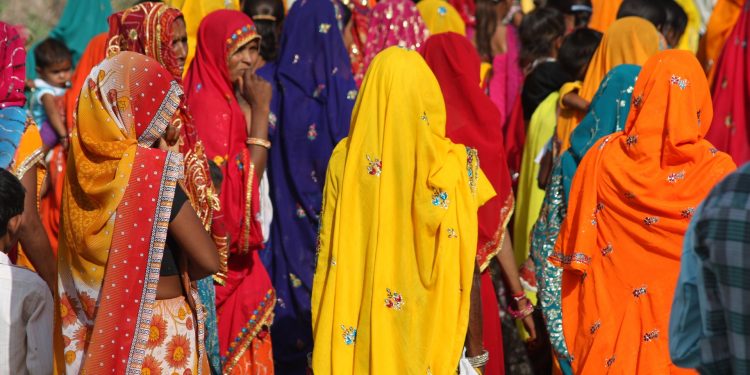Sabarimala – Symbol of Patriarchy

If Sabarimala is one of the most inclusive temples in India where even a Dalit person can be a priest and the Brahmin devotee has to touch his feet, then why does its ‘God’ not want women near him? Is it really an issue about religious practices or just a reflection of patriarchy?
It’s a question which finds its answer through the paths of crude patriarchy. The customs and practices are driven by folklore about the lord Ayyappan who is a celibate (Naishtika Brahmachari), a person who abstains from marriage and sexual relations. It’s ironic that the god we talk about is the ideal person who will take care of all our grievances. He is the exemplary man in the society but in this story, we find a man’s weakness and explicit mention of his attraction towards a woman.
Historical Perspective
Lord Ayyappan, the deity of Sabarimala, was the child of both Shiva and Vishnu with the purpose to kill a female demon and listen to the devotees known as the kanni swamis in Sabarimala. When he killed her, a beautiful woman named Malikappurathamma came out. She was cursed to live like a demon until she was killed by a man. She then asked lord Ayyappan to marry her, but the lord could not negate his sole purpose to listen to his devotees. So he said he’ll marry her the day the devotees – the kanni swamis – stop coming to Sabarimala. She waits for this day in a nearby shrine because he does not want young women around him to distract him during such a long wait.
Why are women not allowed to enter?
“In the case of Sabarimala Devasthanam also, it is an issue of a local temple tradition and faith to which sentiments of millions of devotees, including women, are attached. These sentiments of the devotees cannot be ignored while considering the judgment.” – Official RSS Statement.
Due to this story floating around, people, as a mark of respect towards the woman i.e. Malikappurathamma and to make sure that Lord Ayyappan is not distracted by young women, do not allow women of a younger age to enter.
Those who give this argument as an excuse to deny entry to women must consider the fact that history is written by man himself and not ‘god’. If God is pictured as someone who treats the young woman as nothing more than a centre of attraction, then how can we not expect men to get distracted by women just like Lord Indra was distracted by Ahalya while raping her, king Duryodhana by Draupadi while disrobing her, and lord Raavan by Sita while kidnapping her? This is NOT acceptable in a society where women and in fact, every disadvantaged group is working towards betterment. This shows the presence of crude patriarchy and hence this ban should be uplifted to make sure that women, who were disadvantaged for ages, are given an equal position in the religious domain. Portraying the highest entity in such a way is nothing but a license to make sure that when men are ‘distracted’ by a woman, they can shed the blame off. It’s not the god but the storytellers who use such instances to show how men can do anything and women cannot protect themselves; the women need the Pandava or Ram in their lives to protect themselves from the ‘distractions’ they give to the so-called ‘innocent’ men in the society who just ‘cannot’ control themselves.
Reflection of patriarchy through religion
I would like to refer to Tulsidas’s verses from Ramcharitmanas –
“Dhol Ganwar Shudra Pashu Nari
Sakal Taadna Ke Adhikari”
These lines substantiate the fact that in the later puranic society, people had been following patriarchal norms and women were placed equivalent to Pashu – animals, Shudra – the untouchable, and the musical instrument, Dhol, which needs to be beaten to make it work.
As we move forward towards the Puranic Hinduism (3500 years ago), the social fabric was now dyed with the influence of Europeans, Romance, Islam, and the Greeks. It was in this period when the two epics, Mahabharata and Ramayana, were written along with the texts like manusmriti and Natya Shastra. This was the period when social stratification happened and women were put into the lowest strata.
Manusmriti preaches that
“As a girl, she should obey and seek protection of her father,
As a young woman from her husband and as a widow from her son,
And that woman should always worship her husband as a God.”
The Anushashana Parva of the Hindu Epic Mahabharata has several chapters dedicated to the discussion about the duties and the rights of women. It gives a mixed picture in Chapter 11-
“The Goddess of wealth and prosperity that is Lakshmi asserts that she lives in those women who are truthful sincere modest and kind to the guest and not those who disagree with her husband”.
This confirms the existence of stereotypes in society by promoting a wife who obeys her husband while insisting that one who does not will have not have any Lakshmi (prosperity) in their house. The religious practices and traditions often reflect the thinking and mentality of the society. That is the reason our history-made gods have so ideally portrayed sexual division of labour, with women being a tool to birth the legitimate heir and take care of her husband, even fasting to make sure he lives longer, and men going to hunt and sustaining the house materially. This is evident through various customs like the Karwa Chauth – the festival in which the wife keeps a fast for her husband’s long life.
Fundamental rights are not gender-specific
Fundamental rights are guaranteed by the constitution and no person or group of persons are placed above it. Hence, they cannot take away the rights in the name of god or whatsoever.
The prohibition of women in a public place is a clear violation of Article 25 – a fundamental right – which cannot be taken away by anyone. Therefore, the women must have their right.
The five-judge bench; headed by then CJI Dipak Misra with Justices RF Nariman, AM Khanwilkar, DY Chandrachud and Indu Malhotra; pronounced the verdict, with Malhotra dissenting.
- CJI Dipak Misra said that a woman is not inferior to a man and patriarchy cannot be permitted to trump over faith
- Justice Chandrachud said that to treat women as children of a lesser god is to blink at the Constitution itself
It’s time to change the old notions
This is not a lecture about feminism nor equal rights for men and women, but it is to discuss why men tend to control women and consider it a part of masculinity.
Well, when humans started to settle down and were eating what they produced in the form of crops and domesticated animals, people thought about the carrying forward of the property they had. Obviously, they did not have bungalows, but they had animals, huts, etc. which had to be maintained after they perish.
For that, the man required a child or an heir, a legitimate child to socially acknowledge the sexual relationship of husband to wife, and society needed to come up with institutions like marriage, family, etc. To confirm the legitimacy of the child conceived, men thought it was necessary to control and regulate the woman and keep her from interacting with other men. Hence, not letting them work, not allowing them to go out or to sum up, not allowing women to come out in the social arena, was men’s ways of being sure that the property is given to his DNA only. Since there was no DNA test available, maybe this was the best solution they could have thought of to protect their masculinity.
It’s high time we change these notions and consider freedom not only as a matter of empowerment but as a matter of acceptance, be it the case of women, men, or the LGBTQ.
Final argument
I believe that not only women but everyone must possess the right to move freely anywhere without dictation by the state or the society. Everyone has the guaranteed fundamental right to worship and to practice, profess and propagate their religion unless it undermines the provision of the constitution. This right is not gender-specific and thus, people cannot deny a woman’s entry to a public place just because the history tellers believe that God is distracted by them.
Image Attribute: Pixabay




